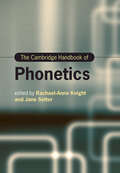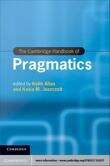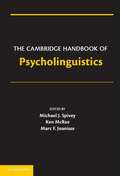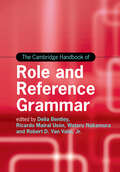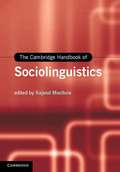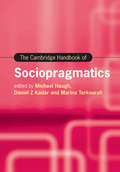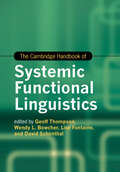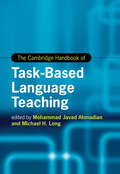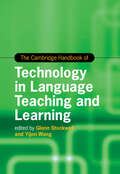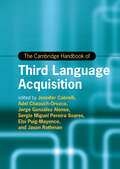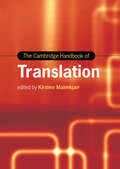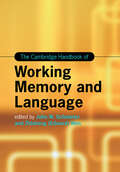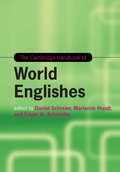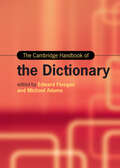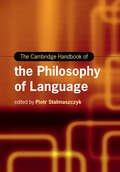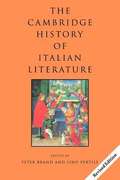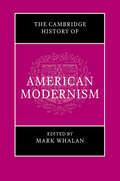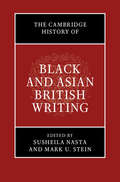- Table View
- List View
The Cambridge Handbook of Metaphor and Thought
by Raymond W. Gibbs Jr.The Cambridge Handbook of Metaphor and Thought offers the most comprehensive collection of essays in multidisciplinary metaphor scholarship that has ever been published. These essays explore the significance of metaphor in language, thought, culture, and artistic expression. There are five main themes of the book: the roots of metaphor, metaphor understanding, metaphor in language and culture, metaphor in reasoning and feeling, and metaphor in nonverbal expression. Contributors come from a variety of academic disciplines, including psychology, linguistics, philosophy, cognitive science, literature, education, music, and law.
The Cambridge Handbook of Phonetics (Cambridge Handbooks in Language and Linguistics)
by Rachael-Anne Knight Jane SetterPhonetics - the study and classification of speech sounds - is a major sub-discipline of linguistics. Bringing together a team of internationally renowned phoneticians, this handbook provides comprehensive coverage of the most recent, cutting-edge work in the field, and focuses on the most widely-debated contemporary issues. Chapters are divided into five thematic areas: segmental production, prosodic production, measuring speech, audition and perception, and applications of phonetics. Each chapter presents an historical overview of the area, along with critical issues, current research and advice on the best practice for teaching phonetics to undergraduates. It brings together global perspectives, and includes examples from a wide range of languages, allowing readers to extend their knowledge beyond English. By providing both state-of-the-art research information, and an appreciation of how it can be shared with students, this handbook is essential both for academic phoneticians, and anyone with an interest in this exciting, rapidly developing field.
The Cambridge Handbook of Pragmatics
by Kasia M. Jaszczolt Keith AllanPragmatics is the study of human communication: the choices speakers make to express their intended meaning and the kinds of inferences that hearers draw from an utterance in the context of its use. This Handbook surveys pragmatics from different perspectives, presenting the main theories in pragmatic research, incorporating seminal research as well as cutting-edge solutions. It addresses questions of rational and empirical research methods, what counts as an adequate and successful pragmatic theory, and how to go about answering problems raised in pragmatic theory. In the fast-developing field of pragmatics, this Handbook fills the gap in the market for a one-stop resource to the wide scope of today's research and the intricacy of the many theoretical debates. It is an authoritative guide for graduate students and researchers with its focus on the areas and theories that will mark progress in pragmatic research in the future.
The Cambridge Handbook of Psycholinguistics
by Michael J. Spivey Ken Mcrae Marc F. JoanisseOur ability to speak, write, understand speech, and read is critical to our ability to function in today's society. As such, psycholinguistics, or the study of how humans learn and use language, is a central topic in cognitive science. This comprehensive handbook is a collection of chapters written not by practitioners in the field, who can summarize the work going on around them, but by trailblazers from a wide array of subfields, who have been shaping the field of psycholinguistics over the last decade. Some topics discussed include how children learn language, how average adults understand and produce language, how language is represented in the brain, how brain-damaged individuals perform in terms of their language abilities, and computer-based models of language and meaning. This is required reading for advanced researchers, graduate students, and upper-level undergraduates who are interested in the recent developments and the future of psycholinguistics.
The Cambridge Handbook of Role and Reference Grammar (Cambridge Handbooks in Language and Linguistics)
by Delia Bentley Ricardo Mairal Usón Wataru Nakamura Robert D. Van Valin Jr.Role and Reference Grammar (RRG) is a theory of language in which linguistic structures are accounted for in terms of the interplay of discourse, semantics and syntax. With contributions from a team of leading scholars, this Handbook provides a field-defining overview of RRG. Assuming no prior knowledge, it introduces the framework step-by-step, and includes a pedagogical guide for instructors. It features in-depth discussions of syntax, morphology, and lexical semantics, including treatments of lexical and grammatical categories, the syntax of simple clauses and complex sentences, and how the linking of syntax with semantics and discourse works in each of these domains. It illustrates RRG's contribution to the study of language acquisition, language change and processing, computational linguistics, and neurolinguistics, and also contains five grammatical sketches which show how RRG analyses work in practice. Comprehensive yet accessible, it is essential reading for anyone who is interested in how grammar interfaces with meaning.
The Cambridge Handbook of Second Language Acquisition
by Julia Herschensohn Martha Young-ScholtenWhat is language and how can we investigate its acquisition by children or adults? What perspectives exist from which to view acquisition? What internal constraints and external factors shape acquisition? What are the properties of interlanguage systems? This comprehensive 31-chapter handbook is an authoritative survey of second language acquisition (SLA). Its multi-perspective synopsis on recent developments in SLA research provides significant contributions by established experts and widely recognized younger talent. It covers cutting edge and emerging areas of enquiry not treated elsewhere in a single handbook, including third language acquisition, electronic communication, incomplete first language acquisition, alphabetic literacy and SLA, affect and the brain, discourse and identity. Written to be accessible to newcomers as well as experienced scholars of SLA, the Handbook is organised into six thematic sections, each with an editor-written introduction.
The Cambridge Handbook of Sociolinguistics
by Rajend MesthrieThe most comprehensive overview available, this handbook is an essential guide to sociolinguistics today. Reflecting the breadth of research in the field, it surveys a range of topics and approaches in the study of language variation and use in society. As well as linguistic perspectives, the handbook includes insights from anthropology, social psychology, the study of discourse and power, conversation analysis, theories of style and styling, language contact and applied sociolinguistics. Language practices seem to have reached new levels since the communications revolution of the late twentieth century. At the same time face-to-face communication is still the main force of language identity, even if social and peer networks of the traditional face-to-face nature are facing stiff competition of the Facebook-to-Facebook sort. The most authoritative guide to the state of the field, this handbook shows that sociolinguistics provides us with the best tools for understanding our unfolding evolution as social beings.
The Cambridge Handbook of Sociopragmatics (Cambridge Handbooks in Language and Linguistics)
by Dániel Z. Kádár Michael Haugh Marina TerkourafiSociopragmatics is a rapidly growing field and this is the first ever handbook dedicated to this exciting area of study. Bringing together an international team of leading editors and contributors, it provides a comprehensive, cutting-edge overview of the key concepts, topics, settings and methodologies involved in sociopragmatic research. The chapters are organised in a systematic fashion, and span a wide range of theoretical research on how language communicates multiple meanings in context, how it influences our daily interactions and relationships with others, and how it helps construct our social worlds. Providing insight into a fascinating array of phenomena and novel research directions, the Handbook is not only relevant to experts of pragmatics but to any reader with an interest in language and its use in different contexts, including researchers in sociology, anthropology and communication, and students of applied linguistics and related areas, as well as professional practitioners in communication research.
The Cambridge Handbook of Stylistics
by Peter Stockwell Sara WhiteleyStylistics has become the most common name for a discipline which at various times has been termed 'literary linguistics', 'rhetoric', 'poetics', 'literary philology' and 'close textual reading'. This Handbook is the definitive account of the field, drawing on linguistics and related subject areas such as psychology, sociology, anthropology, educational pedagogy, computational methods, literary criticism and critical theory. Placing stylistics in its intellectual and international context, each chapter includes a detailed illustrative example and case study of stylistic practice, with arguments and methods open to examination, replication and constructive critical discussion. As an accessible guide to the theory and practice of stylistics, it will equip the reader with a clear understanding of the ethos and principles of the discipline, as well as with the capacity and confidence to engage in stylistic analysis.
The Cambridge Handbook of Systemic Functional Linguistics (Cambridge Handbooks in Language and Linguistics)
by David SchönthalPresenting a field-defining overview of one of the most appliable linguistic theories available today, this Handbook surveys the key issues in the study of systemic functional linguistics (SFL), covering an impressive range of theoretical perspectives. Written by some of the world's foremost SFL scholars, including M. A. K. Halliday, the founder of SFL theory, the handbook covers topics ranging from the theory behind the model, discourse analysis within SFL, applied SFL, to SFL in relation to other subfields of linguistics such as intonation, typology, clinical linguistics and education. Chapters include discussion on the possible future directions in which research might be conducted and issues that can be further investigated and resolved. Readers will be inspired to pursue the challenges raised within the volume, both theoretically and practically.
The Cambridge Handbook of Task-Based Language Teaching (Cambridge Handbooks in Language and Linguistics)
by Michael H. Long Mohammad J. AhmadianTask-based language teaching (TBLT) is an innovative approach to language teaching which emphasises the importance of engaging learners' natural abilities for acquiring language incidentally. The speed with which the field is expanding makes it difficult to keep up with recent developments, for novices and experienced researchers alike. This handbook meets that need, providing a comprehensive, up-to-date overview of the field, written by a stellar line-up of leading international experts. Chapters are divided into five thematic areas, and as well as covering theory, also contain case studies to show how TBLT can be implemented in practice, in a range of global contexts, as well as questions for discussion, and suggested further readings. Comprehensive in its coverage, and written in an accessible style, it will appeal to a wide readership, not only researchers and graduate students, but also classroom teachers working in a variety of educational and cultural contexts around the world.
The Cambridge Handbook of Technology in Language Teaching and Learning (Cambridge Handbooks in Language and Linguistics)
by Glenn Stockwell Yijen WangThe use of technology in various language teaching and learning contexts has become increasingly commonplace in recent years. This has resulted in an enormous range of choices for teachers and researchers in the field, but at the same time, it has also become more and more difficult for those who are new to using technology for language teaching and researching to keep up with these changes. This handbook provides a wide-ranging, accessible overview of technology in language teaching and learning by leading experts in the field from around the world. The chapters are split into six thematic parts, covering a multitude of subject areas whilst also highlighting the relationships between the topics covered. Showcasing the diversity and complexity of the field in a comprehensive yet approachable manner, it is essential reading for academic researchers and graduate students, as well as pre-service and in-service teachers in various global contexts.
The Cambridge Handbook of Third Language Acquisition (Cambridge Handbooks in Language and Linguistics)
by Jason Rothman Eloi Puig-Mayenco Jennifer Cabrelli Adel Chaouch-Orozco Jorge González Alonso Pereira Soares, Sergio MiguelIn our increasingly multilingual modern world, understanding how languages beyond the first are acquired and processed at a brain level is essential to design evidence-based teaching, clinical interventions and language policy. Written by a team of world-leading experts in a wide range of disciplines within cognitive science, this Handbook provides a comprehensive overview of the study of third (and more) language acquisition and processing. It features 30 approachable chapters covering topics such as multilingual language acquisition, education, language maintenance and language loss, multilingual code-switching, ageing in the multilingual brain, and many more. Each chapter provides an accessible overview of the state of the art in its topic, while offering comprehensive access to the specialized literature, through carefully curated citations. It also serves as a methodological resource for researchers in the field, offering chapters on methods such as case studies, corpora, artificial language systems or statistical modelling of multilingual data.
The Cambridge Handbook of Translation (Cambridge Handbooks in Language and Linguistics)
by Kirsten MalmkjærTranslation plays a vital role in society – it allows us to share knowledge and enrich our lives through access to other cultures. Translation studies is a rapidly evolving academic discipline, directly impacted by advances in technological aids, and with close connections between theory and practice. Bringing together contributions from internationally-renowned scholars, this Handbook offers an authoritative, up-to-date account of the many facets of this buoyant discipline. It covers different themes, areas of practice and developing trends, and provides an overview of the major sub-fields, and the connections between them. It is organised into six parts covering the nature of translation, its roles in society, its relationships with other disciplines, a selection of its factual genres, a selection of its art-related genres and, finally, its role in history. Comprehensive yet accessible, it is essential reading for students, teachers and scholars of translation studies, modern languages, linguistics, social studies and literary studies.
The Cambridge Handbook of Working Memory and Language (Cambridge Handbooks in Language and Linguistics)
by John W. Schwieter Zhisheng WenBringing together cutting-edge research, this Handbook is the first comprehensive text to examine the pivotal role of working memory in first and second language acquisition, processing, impairments, and training. Authored by a stellar cast of distinguished scholars from around the world, the Handbook provides authoritative insights on work from diverse, multi-disciplinary perspectives, and introduces key models of working memory in relation to language. Following an introductory chapter by working memory pioneer Alan Baddeley, the collection is organized into thematic sections that discuss working memory in relation to: Theoretical models and measures; Linguistic theories and frameworks; First language processing; Bilingual acquisition and processing; and Language disorders, interventions, and instruction. The Handbook is sure to interest and benefit researchers, clinicians, speech therapists, and advanced undergraduate and postgraduate students in linguistics, psychology, education, speech therapy, cognitive science, and neuroscience, or anyone seeking to learn more about language, cognition and the human mind.
The Cambridge Handbook of World Englishes (Cambridge Handbooks in Language and Linguistics)
by Marianne Hundt Daniel Schreier Edgar W. SchneiderThe plural form 'Englishes' conveys the diversity of English as a global language, pinpointing the growth and existence of a large number of national, regional and social forms. The global spread of English and the new varieties that have emerged around the world has grown to be a vast area of study and research, which intersects multiple disciplines. This Handbook provides a comprehensive and authoritative survey of World Englishes from 1600 to the present day. Covering topics such as variationist sociolinguistics, pragmatics, contact linguistics, linguistic anthropology, corpus- and applied linguistics and language history, it combines discussion of traditional topics with a variety of innovative approaches. The chapters, all written by internationally acclaimed authorities, provide up-to-date discussions of the evolution of different Englishes around the globe, a comprehensive coverage of different models and approaches, and some original perspectives on current challenges.
The Cambridge Handbook of the Dictionary (Cambridge Handbooks in Language and Linguistics)
by Michael Adams Edward FineganThere is no such thing as 'the dictionary'. Rather, there are innumerable kinds of dictionaries that respond to their authors' aspirations and their users' needs. In each case, the negotiation among a dictionary's material, its authors, and its readers tells a rich cultural story. Bringing together cutting-edge research from an international team of experts, this interdisciplinary Handbook provides an all-encompassing account of dictionaries in context. Organized into five thematic parts, its chapters cover a multitude of topics such as types of dictionaries, the place of dictionaries in intellectual, cultural and book history, and dictionaries as material objects, as well as their visual design. It also explores the role of dictionaries in a select group of special fields where words especially matter (for instance, law), the business contexts in which dictionaries are made, and finally the future of dictionaries. There is no fuller or more compelling overview of dictionaries available today.
The Cambridge Handbook of the Philosophy of Language (Cambridge Handbooks in Language and Linguistics)
by Piotr StalmaszczykThe philosophy of language is central to the concerns of those working across semantics, pragmatics and cognition, as well as the philosophy of mind and ideas. Bringing together an international team of leading scholars, this handbook provides a comprehensive guide to contemporary investigations into the relationship between language, philosophy, and linguistics. Chapters are grouped into thematic areas and cover a wide range of topics, from key philosophical notions, such as meaning, truth, reference, names and propositions, to characteristics of the most recent research in the field, including logicality of language, vagueness in natural language, value judgments, slurs, deception, proximization in discourse, argumentation theory and linguistic relativity. It also includes chapters that explore selected linguistic theories and their philosophical implications, providing a much-needed interdisciplinary perspective. Showcasing the cutting-edge in research in the field, this book is essential reading for philosophers interested in language and linguistics, and linguists interested in philosophical analyses.
The Cambridge History Of Italian Literature
by Peter Brand Lino PertileItaly possesses one of the richest and most influential literatures of Europe, stretching back to the thirteenth century. This substantial history of Italian literature provides a comprehensive survey of Italian writing since its earliest origins. Leading scholars describe and assess the work of writers who have contributed to the Italian literary tradition, including Dante, Petrarch and Boccaccio, the Renaissance humanists, Machiavelli, Ariosto and Tasso, pioneers and practitioners of commedia dell'arte and opera, and the contemporary novelists Calvino and Eco. The Cambridge History of Italian Literature sets out to be accessible to the general reader as well as to students and scholars: translations are provided, along with a map, chronological chart and substantial bibliographies.
The Cambridge History of African American Literature
by Maryemma Graham Jerry W. WardThe first major twenty-first century history of four hundred years of black writing, The Cambridge History of African American Literature presents a comprehensive overview of the literary traditions, oral and print, of African-descended peoples in the United States. Expert contributors, drawn from the United States and beyond, emphasize the dual nature of each text discussed as a work of art created by an individual and as a response to unfolding events in American cultural, political, and social history. Unprecedented in scope, sophistication and accessibility, the volume draws together current scholarship in the field. It also looks ahead to suggest new approaches, new areas of study, and as yet undervalued writers and works. The Cambridge History of African American Literature is a major achievement both as a work of reference and as a compelling narrative and will remain essential reading for scholars and students in years to come.
The Cambridge History of American Modernism (The Cambridge History of American Literature)
by Mark WhalanThe Cambridge History of American Modernism examines one of the most innovative periods of American literary history. It offers a comprehensive account of the forms, genres, and media that characterized US modernism: coverage ranges from the traditional, such as short stories, novels, and poetry, to the new media that shaped the period's literary culture, such as jazz, cinema, the skyscraper, and radio. This volume charts how recent methodologies such as ecocriticism, geomodernism, and print culture studies have refashioned understandings of the field, and attends to the contestations and inequities of race, sovereignty, gender, sexuality, and ethnicity that shaped the period and its cultural production. It also explores the geographies and communities wherein US modernism flourished-from its distinctive regions to its metropolitan cities, from its hemispheric connections to the salons and political groupings that hosted new cultural collaborations.
The Cambridge History of American Poetry
by Stephen Burt Alfred BendixenThe Cambridge History of American Poetry offers a comprehensive exploration of the development of American poetic traditions from their beginnings until the end of the twentieth century. Bringing together the insights of fifty distinguished scholars, this literary history emphasizes the complex roles that poetry has played in American cultural and intellectual life, detailing the variety of ways in which both public and private forms of poetry have met the needs of different communities at different times. The Cambridge History of American Poetry recognizes the existence of multiple traditions and a dramatically fluid canon, providing current perspectives on both major authors and a number of representative figures whose work embodies the diversity of America's democratic traditions.
The Cambridge History of American Women's Literature
by Dale M. BauerThe field of American women's writing is one characterized by innovation: scholars are discovering new authors and works, as well as new ways of historicizing this literature, rethinking contexts, categories and juxtapositions. Now, after three decades of scholarly investigation and innovation, the rich complexity and diversity of American literature written by women can be seen with a new coherence and subtlety. Dedicated to this expanding heterogeneity, The Cambridge History of American Women's Literature develops and challenges historical, cultural, theoretical, even polemical methods, all of which will advance the future study of American women writers - from Native Americans to postmodern communities, from individual careers to communities of writers and readers. This volume immerses readers in a new dialogue about the range and depth of women's literature in the United States and allows them to trace the ever-evolving shape of the field.
The Cambridge History of Asian American Literature
by Rajini SrikanthThe Cambridge History of Asian American Literature presents a comprehensive history of the field, from its origins in the nineteenth century to the present day. It offers an unparalleled examination of all facets of Asian American writing that help readers to understand how authors have sought to make their experiences meaningful. Covering subjects from autobiography and Japanese American internment literature to contemporary drama and social protest performance, this History traces the development of a literary tradition while remaining grounded in current scholarship. It also presents new critical approaches to Asian American literature that will serve the needs of students and specialists alike. Written by leading scholars in the field, The Cambridge History of Asian American Literature will not only engage readers in contemporary debates but also serve as a definitive reference for years to come.
The Cambridge History of Black and Asian British Writing
by Susheila Nasta Mark U. SteinThe Cambridge History of Black and Asian British Writing provides a comprehensive historical overview of the diverse literary traditions impacting on this field's evolution, from the eighteenth century to the present. Drawing on the expertise of over forty international experts, this book gathers innovative scholarship to look forward to new readings and perspectives, while also focusing on undervalued writers, texts, and research areas. Creating new pathways to engage with the naming of a field that has often been contested, readings of literary texts are interwoven throughout with key political, social, and material contexts. In making visible the diverse influences constituting past and contemporary British literary culture, this Cambridge History makes a unique contribution to British, Commonwealth, postcolonial, transnational, diasporic, and global literary studies, serving both as one of the first major reference works to cover four centuries of black and Asian British literary history and as a compass for future scholarship.

